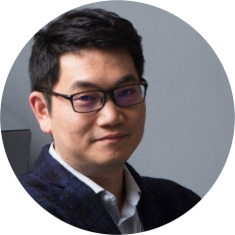
Download Lucas Klein’s introduction to Duo Duo’s
Words as Grain HERE.
“How to make sense of Duo Duo’s poetry is the overarching question it poses, at the root of its political significance as well as its literary interest. In the words of his 1987 poem “Remade,” he has worked to “remake language with remade tools” and “with remade language / keep remaking.” How should his continued remaking be read? What does the reader need in order to understand his remade language?”
—Lucas Klein
THE FORCE OF FORGING WORDS:
A Translation Conversation
You are cordially invited to join “The Force of Forging Words: A Translation Conversation”, which will take place on Zoom.
In “The Force of Forging Words,” a poem in 𝑊𝑜𝑟𝑑𝑠 𝑎𝑠 𝐺𝑟𝑎𝑖𝑛: 𝑁𝑒𝑤 & 𝑆𝑒𝑙𝑒𝑐𝑡𝑒𝑑 𝑃𝑜𝑒𝑚𝑠 by premier Chinese poet Duo Duo 多多 (Yale University Press, The Cecile and Theodore Margellos World Republic of Letters series), translated by Lucas Klein, Duo Duo writes: “outside force, continuing on / from enough, is insufficient hallucination // … // this is rationale’s wasteland / but the ethics of poetry.”
What are the ethics of poetry? Is poetry the wasteland of the rationale, or of the rational? Is translation a kind of hallucination, and is it sufficient? What care needs to be taken to translate such poetry? Our speakers Nick Admussen, Chris Song, and Jami Proctor Xu will discuss these questions with translator Lucas Klein, to celebrate the publication of 𝑊𝑜𝑟𝑑𝑠 𝑎𝑠 𝐺𝑟𝑎𝑖𝑛.
Moderator: Tammy Lai-Ming Ho (Email: t@asiancha.com).
▁▁▁▁
THE FORCE OF FORGING WORDS:
A Translation Conversation
Zoom: https://bit.ly/3wAgrXA
Meeting ID: 988 5804 6038
Date & Time:
▚ Arizona—Friday 9 July 2021; 6 pm
▚ Hong Kong—Saturday 10 July 2021; 9 am
Global Clock: https://bit.ly/2SDuUTR
▁▁▁▁
BIOS:

◓ NICK ADMUSSEN (speaker)
Nick Admussen is an associate professor of Chinese literature and culture at Cornell University. He is the author of Recite and Refuse: Contemporary Chinese Prose Poetry, the translator of Ya Shi’s 哑石 poetry collection 𝐹𝑙𝑜𝑟𝑎𝑙 𝑀𝑢𝑡𝑡𝑒𝑟, and a poet whose most recent chapbook is titled 𝑆𝑡𝑎𝑛𝑑 𝐵𝑎𝑐𝑘, 𝐷𝑜𝑛’𝑡 𝐹𝑒𝑎𝑟 𝑡ℎ𝑒 𝐶ℎ𝑎𝑛𝑔𝑒. His works of translation theory include “Embodiment in Chinese Poetry” and “Forms of World Literature and the Taipei Poetry Festival”; he is currently finishing a monograph on stricture in Chinese poetry and American culture. Visit his website for more information.

◓ TAMMY LAI-MING HO (moderator)
Tammy Lai-Ming Ho hates going to Hong Kong island, but she used to hate going to Kowloon, once upon a time. She grew up in public housing, earned a PhD in London, and flew surreptitiously to Paris a number of times in the old days. She is the author of two books of poetry (𝐻𝑢𝑙𝑎 𝐻𝑜𝑜𝑝𝑖𝑛𝑔 and 𝑇𝑜𝑜 𝑇𝑜𝑜 𝑇𝑜𝑜 𝑇𝑜𝑜), one book of prose poems (𝐻𝑒𝑟 𝑁𝑎𝑚𝑒 𝑈𝑝𝑜𝑛 𝑡ℎ𝑒 𝑆𝑡𝑟𝑎𝑛𝑑) which she will say are stories, a “sci-fi” chapbook (𝐴𝑛 𝐸𝑥𝑡𝑟𝑎𝑡𝑒𝑟𝑟𝑒𝑠𝑡𝑟𝑖𝑎𝑙 𝑖𝑛 𝐻𝑜𝑛𝑔 𝐾𝑜𝑛𝑔), and an academic monograph (𝑁𝑒𝑜-𝑉𝑖𝑐𝑡𝑜𝑟𝑖𝑎𝑛 𝐶𝑎𝑛𝑛𝑖𝑏𝑎𝑙𝑖𝑠𝑚). She is also the editor-in-chief of Hong Kong’s first English-language online literary publication (𝐶ℎ𝑎, at chajournal & asiancha), a co-editor of the first academic journal devoted to Hong Kong (𝐻𝑜𝑛𝑔 𝐾𝑜𝑛𝑔 𝑆𝑡𝑢𝑑𝑖𝑒𝑠), and the English editor of 𝑉𝑜𝑖𝑐𝑒 & 𝑉𝑒𝑟𝑠𝑒 𝑃𝑜𝑒𝑡𝑟𝑦 𝑀𝑎𝑔𝑎𝑧𝑖𝑛𝑒 (聲韻詩刊). She is an Associate Professor of literature at Hong Kong Baptist University where she teaches courses she loves. She prefers many things to many, many, many other things. (Photograph of Tammy © Hong Kong Baptist University.)

◓ LUCAS KLEIN (featured speaker)
Lucas Klein has lived on three continents, in five US states, and in the capital, in internationally unrecognised, and in special administrative regions of China. He has been a radio DJ, a union organiser, and a factotum for a literary journal whose editor later died a day after losing a congressional election. He earned a PEN/Heim grant for his translations of Duo Duo’s 𝑊𝑜𝑟𝑑𝑠 𝑎𝑠 𝐺𝑟𝑎𝑖𝑛 (Yale University Press, 2021), and has also published translations of Xi Chuan (New Directions, 2012, 2023), Mang Ke (Zephyr, 2018), and Li Shangyin (NYRB, 2018), and is executive editor of the Hsu-Tang Library of Classical Chinese Literature (Oxford). He has two kids and teaches at Arizona State University. (Photograph of Lucas © Zhai Yongming.)

◓ CHRIS SONG (speaker)
Chris Song is a poet, translator, and editor based in Hong Kong. He has published four collections of poetry and many volumes of poetry in translation. He received an “Extraordinary Mention” at Italy’s UNESCO-recognised Nosside World Poetry Prize 2013 and the Young Artist Award at the 2017 Hong Kong Arts Development Awards. In 2018 he obtained a PhD in Translation Studies from Lingnan University. More recently he won the Haizi Poetry Award in 2019. Chris is now Executive Director of International Poetry Nights in Hong Kong and Editor-in-Chief of 𝑉𝑜𝑖𝑐𝑒 & 𝑉𝑒𝑟𝑠𝑒 𝑃𝑜𝑒𝑡𝑟𝑦 𝑀𝑎𝑔𝑎𝑧𝑖𝑛𝑒 (聲韻詩刊). (Photograph of Chris © Hong Kong Arts Development Council.)

◓ JAMI PROCTOR XU (speaker)
Jami Proctor Xu is a poet, mother and translator. She writes in English and Chinese and splits her time between Northern California, Arizona, and China. Her publications include, among others, a Chinese chapbook, Shimmers (EMS, 2013) a Chinese poetry collection 𝑆𝑢𝑑𝑑𝑒𝑛𝑙𝑦 𝑆𝑡𝑎𝑟𝑡𝑖𝑛𝑔 𝑡𝑜 𝐷𝑎𝑛𝑐𝑒 (Yi, 2016), an English chapbook, 𝐻𝑢𝑚𝑚𝑖𝑛𝑔𝑏𝑖𝑟𝑑 𝐼𝑔𝑛𝑖𝑡𝑒𝑠 𝑎 𝑆𝑡𝑎𝑟, the translated collection of Jidi Majia, 𝑊𝑜𝑟𝑑𝑠 𝑓𝑟𝑜𝑚 𝑡ℎ𝑒 𝐹𝑖𝑟𝑒 (Manoa, 2018), and the translated collection of Song Lin, 𝑆𝑢𝑛𝑑𝑎𝑦 𝑆𝑝𝑎𝑟𝑟𝑜𝑤𝑠. Her current translation projects include translations of poetry collections by Zhao Ye and Xiao Xiao. Jami is also co-editing an anthology of Chinese translations of US poets born in the 1970s. Since 2016, she has co-organised an annual international poetry exchange at Beijing Normal University’s International Writing Center, and since 2019, she has collaborated with Zolani Mkiva to co-organise international poetry events in South Africa and neighbouring countries. Jami frequently reads at festivals around the world, and her poetry and translations have been published in anthologies in several languages. She is a recipient of the Zhujiang Poetry Award (2013), the First Reader Best Poet Award (2016), and the Northern California Book Award for Poetry in Translation (2020)





















Pingback: Liang Luo on Duo Duo’s Words as Grain | Notes on the Mosquito